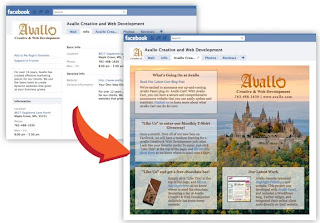Get Noticed with Facebook Pages
Jun 16th, 2010 5:06 pmFacebook profiles, groups, and pages. What are they, and how can you use them to your advantage? Which one best fits your goals for your business? Read on to learn more about how to optimize your Facebook page for your followers, and how to get noticed in the multitude of Facebook pages.
Facebook Profiles
Facebook profiles are intended for personal use. One of the biggest faux pas I have seen is a business or organization creating a Facebook profile. Why is this wrong? For one, it's difficult to find a business or organization that's linked to a Facebook profile. Profiles are also set up to be more private than a group or a page. Instead of just clicking "like" and immediately becoming a fan, you must submit a "friend" request. If you want to have thousands of fans (and who wouldn't!?), you would then have to accept each of those friend requests separately. Additionally, you cannot contact all of your customers at once. Both groups and pages allow you to contact all of your customers with one quick message.
A profile also limits to you one account to modify, update, and change information. To have multiple administrators, you would have to pass out the user name and password to the profile to everybody, which has its own security problems. If an employee decides to leave the company, you would have to change the password and alert all other employees of the change. It's not very efficient.
Bottom line: if you're a business, corporation, or organization, stay away from profiles. Profiles are great for individual employees, but a Facebook group or page will better represent your company.
Facebook Groups
Groups, while more public than profiles, are also originally intended for personal use. Groups allow you to choose the network the group will appear in, as well as allow an administrator to approve members. This proves useful for organizations that are invite-only.
Like Facebook profiles, there is only one user to administrate the group. You can, however, add group officers to help administrate the group. However, if the creator of the group decides to part ways with your company at any time, they will be stuck as the admin. If this is a concern for you, a Facebook Page is a better choice.
When your customers interact with you, they will be listed as "Members". Their feed will be updated with "Customer Name has joined the group, "Your Organization Name"".
Bottom line: While great for organizations or clubs, Facebook groups don't offer the functionality that business or corporations would need.
Facebook Pages
Intended for businesses, brands, organizations, or even public figures, Facebook pages offer a variety of options that neither groups nor profiles provide. A Facebook page, much like your company, is a separate entity. You can add or remove administrators easily, and administrators are not listed on the account - they remain anonymous. This means that activity reflects on the company as a whole, and not one particular admin.
Facebook also makes it easy to create advertisements for your Facebook page so you can promote it and hopefully gain more fans.
The biggest difference is that pages allow you to add apps to a page, but not a group. Apps allow for greater flexibility and customization for your company. Take Avallo's Facebook page, for example. Instead of seeing the Wall when you visit our page, you are greeted by a full-color and fully customized landing page that points our customers to our website, blog, and other valuable offers and information.
By customizing your Facebook landing page, you can stand out from the crowd. Add some color to the normally blue-and-white Facebook, and get the most important information and updates to your customers.
Even more importantly, pages are indexed by search engines. This means that if someone searches for your company, it's very likely your Facebook page will appear in the results. Groups are not indexed.
The bottom line: Facebook pages are intended for businesses. It only makes sense, if you're a business, to take advantage of a Facebook page.
So what's best for you?
Both pages and groups have their strong points. Ultimately, it's up to your company to decide which will work best for your marketing strategy. Pages are a public company profile that allow you to interact, create events, and send updates to customers. Groups are a more exclusive club that allow invite-only members, and even allow you to send messages to everyone in the group - but this functionality is revoked when you have over 5,000 members.
Pages are indexed by search engines which means it will be easier for your customers to find you. They also allow you to include applications, making it incredibly easy to customize your page and stand out from the crowd. Both pages and groups allow you go create events and interact with your customers.
Once you've decided what you want, let the experts at Avallo help you set up your Facebook page or group, and even create custom apps or landing pages for you. While you're at it, become a fan of Avallo on Facebook and receive a free chocolate bar! You will also be entered into our monthly t-shirt drawing. How awesome is that?



 763-488-1630
763-488-1630